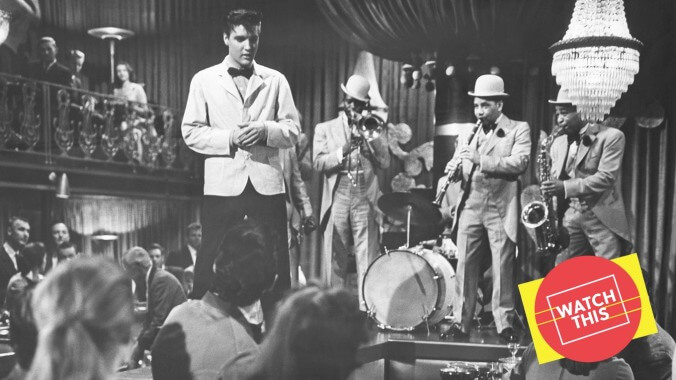Elvis does a mean James Dean in his favorite starring vehicle

Watch This offers movie recommendations inspired by new releases, premieres, current events, or occasionally just our own inscrutable whims. This week: The Janelle Monáe thriller Antebellum was supposed to hit theaters. In its absence, we’re looking back at films starring musicians.
King Creole (1958)
Elvis Presley’s film career looked a lot different in the 1950s than it would in the ’60s. At his start, Presley made a string of stirring black-and-whites that were grittier and much more interesting than the dreck (like Girls! Girls! Girls! and Clambake) the Technicolor film factory would eventually churn out. His character dies in his 1956 film debut, the Civil War-era Western Love Me Tender, followed by the legendary Jailhouse Rock (as well as an early color hit, Loving You) in 1957. But even Elvis thought his film career peaked with 1958’s King Creole, his favorite of his own movies, and his last before getting drafted to Germany.
The movie’s “juvenile delinquent” theme was extremely popular in the ’50s; in fact, King Creole has a lot in common with the 1955 James Dean classic Rebel Without A Cause: A hotheaded kid keeps getting into trouble despite his best efforts, hindered by an ineffectual father not strong enough to give him the guidance he so clearly needs. Creole was originally envisioned as a vehicle for Dean, based on Harold Robbins’ bestselling 1952 novel A Stone For Danny Fisher, about a Brooklyn boy who turns to boxing to support his family when his father can’t.
After Dean’s death, Creole was retooled for Presley, with the setting wisely moved to New Orleans’ French Quarter and Danny’s boxing changed to singing. After Danny fails to graduate from high school for the second time, he gets a chance to sing at the nightclub where he’s a busboy, and soon becomes the pawn in a game between two club owners: the honest Charlie LeGrand (Paul Stewart) and the manipulative crime boss Maxie Fields (Walter Matthau). As Maxie, Matthau shows how deceptively menacing he could be at this stage of his career, cruelly lending out his ruined moll, Ronnie (a pre-Addams Family Carolyn Jones), to try to entice Danny to his way of life. Danny’s torn between her (sample smoldering banter: “It’s a pretty piece of material. You oughta have a dress made out of it”) and good girl Nellie (future nun Dolores Hart). But his biggest struggle is between the life he wants to carve out and the more traditional life his failed father wants for him.








































